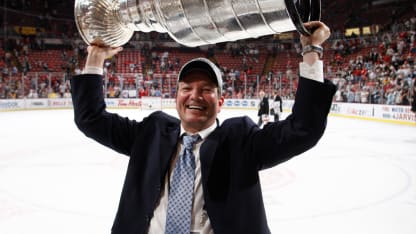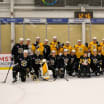When Ray Shero was named general manager of the Penguins in May of 2006, he called Sidney Crosby’s parents and introduced himself.
He said to them, “I’m going to take care of your son, and hopefully it will go well.”
It certainly did. Shero, who died on Wednesday at age 62, had a terrific run with Pittsburgh. He played an instrumental role in ushering in a new era of Penguins hockey, quickly transforming the team into a perennial contender. Led by their young core, the Penguins made back-to-back trips to the Stanley Cup Final, winning it all in 2009.
“Ray Shero was a big part of my early days in Pittsburgh,” Crosby said. “He gave me a lot of opportunity as a young captain and supported me throughout his time. He did so much for our organization, and my memories with him are special. I am grateful for our time spent here and that we were able to share a Stanley Cup Championship together.”
Hockey was in Ray’s blood, as father Fred was inducted into the Hockey Hall of Fame for a career that included coaching Philadelphia to their back-to-back titles in 1974 and ’75. Ray played at St. Lawrence University before going into management, working as an assistant GM with the Ottawa Senators and Nashville Predators before getting the opportunity with Pittsburgh. Shero was hired to replace the legendary Craig Patrick.
“It was a little nerve-racking, to be honest with you,” Shero said in his interview for the team’s 50th anniversary documentary, Pittsburgh is Home. “It’s basically a hard act to follow, and it was my first GM job.”
That certainly didn’t show with his assertive decision-making, as Shero got to work right away figuring out how to return the Penguins back to the promised land. His first move was drafting Jordan Staal second overall, a key addition to the group of young talent that included Crosby, Evgeni Malkin, Kris Letang, and Marc-Andre Fleury. The big forward, who scored 29 goals as an 18-year-old rookie, provided astonishing depth at center and made Pittsburgh incredibly difficult to play against.
The team had a 47-point improvement in the standings during Shero’s first season, the fourth-biggest turnaround in NHL history. At the 2007-08 trade deadline, Shero swung the biggest deal of his Penguins tenure, acquiring Marian Hossa and Pascal Dupuis from Atlanta in exchange for Colby Armstrong, Erik Christensen, and prospect Angelo Esposito (their first-round pick that summer).
Reflecting back on it, Shero had Thrashers GM Don Waddell on one phone, another GM on another phone with a potential deal in the works, and Mario Lemieux on his cell phone. “I said to Mario, here’s the deal – we can do the Hossa thing, and I gotta tell ya, it’s a risk because of the assets and there is no guarantee this kid is going to stay,” Shero recounted in that same interview.
“I still remember Mario saying, look, I bought this team out of bankruptcy with Ron (Burkle), and I’m a risk taker. If you think hockey-wise, it’s a good move, I support it. Okay! Don, we got a deal. That’s the way Mario always was, and it was fantastic.”
That move ended up accelerating Pittsburgh’s progress even further, as the group advanced to the Stanley Cup Final. While the Penguins lost to the Red Wings six games, and Hossa ended up signing with Detroit, they had learned so much from that experience.
But the Penguins faltered in the first half of the 2008-09 campaign, which led to Shero firing Michel Therrien. He called it the hardest decision he’d ever made at that point of his career. But it turned out to be the right one, and hiring Dan Bylsma was a good one, as the rookie coach brought a much-needed vitality.
So did Bill Guerin, a veteran forward Shero added around the deadline in exchange for a conditional draft pick. “I’ve never seen anybody come into a room and feel that comfortable right away. He was awesome. He brought a really good energy. Something we hadn’t had in a while because we were struggling so much,” said Crosby, who said the same thing went for Chris Kunitz, acquired from Anaheim in exchange for Ryan Whitney.
Simply put, Shero changed Guerin’s life by bringing him to Pittsburgh. “I’ll always be very grateful for that, and I’ll never forget it,” Guerin said. Not only did Shero give Guerin a chance to lift the Stanley Cup, but he also helped him transition to the hockey operations/management side.
“When I retired, I called my wife first, and I called Ray Shero second to come in and talk to him and talk about the next step. He was unbelievably good to me,” said Guerin, now GM of the Minnesota Wild, where Shero was working most recently as a senior advisor. “Gave me a position where I could learn a lot of different things about the other side of the business.”
Guerin had so much respect for Shero, who received the NHL’s Jim Gregory General Manager of the Year Award in 2013 after orchestrating the Jarome Iginla trade. While Shero’s teams put together some impressive seasons following that 2009 run, they weren’t able to win again during his tenure.
“I would have loved to have won another Cup with these guys, but you can always look back and say, could we have done this or that.. of course, we can play that game, but I know one thing – ownership, myself, coaches, never left anything on the table,” Shero said. “We went in all the time, and that was good and bad. But it was one of those things because we had Sid and Geno, that’s what you do.”
While Shero was eventually relieved of his duties in 2014, he laid the foundation for Pittsburgh’s future championships in 2016 and ’17. He drafted Bryan Rust (2010), Olli Maatta and Matt Murray (2012) and Jake Guentzel (2013) in higher rounds, along with players like Tom Kuhnhackl (2010) and Scott Wilson (2011) in later rounds. Shero also brought in Brian Dumoulin when trading Staal to Carolina in 2012.
Shero had a knack for identifying talent off the ice as well, and loved giving them opportunities. He always joked that his management style was to hire good people and let them do their thing, and while Shero did have trust in belief in his staff, he was always there to guide and support them.
The list of names Shero brought in includes Bylsma, Guerin, Jason Botterill, Chuck Fletcher, Mike Yeo, John Hynes, Patrik Allvin, and Tom Fitzgerald, with the current Devils GM calling Shero “an enthusiastic mentor.” Kyle Dubas has said that Shero was well-known for developing people who were able to go on and run teams elsewhere, and is trying to carry on that legacy in Pittsburgh.
But Shero’s impact wasn’t just felt on the hockey side of the business. It was felt throughout the entire organization, as Shero created such a special environment and culture in Pittsburgh that truly allowed everyone to thrive.
Like Jennifer Bullano Ridgley, who was promoted into her role as Penguins Chief Communications Officer after joining the team as a graduate intern the same year Shero did. She was eventually hired as Manager of Media Relations in 2008, and about a month into that role, the director abruptly resigned.
That day, Bullano had to go into the locker room and handle the media. Shero put his hand on her shoulder and said, "Well, kid, sink or swim," and opened the door.
“I just want to thank him for allowing me to swim,” Bullano Ridgley said. “He always made me feel safe. He always made sure I was included, he always gave me a voice, and I wouldn’t be where I am today without him. NHL locker rooms weren’t friendly to women in those days, but Ray Shero was. Ray created something special, and the opportunity he gave me is something I will never take for granted.”
Shero was a sharp hockey mind with such a passion for the game, and a class act with character who possessed a phenomenal sense of humor. He always made everyone around him laugh and immediately feel at ease, and Shero’s kindness, generosity and wit will be forever missed.
“Ray Shero’s smile and personality lit up every room he walked into and brightened the day of everyone he met,” NHL commissioner Gary Bettman said. “Widely respected throughout hockey for his team-building acumen and eye for talent, he was even more beloved for how he treated everyone fortunate enough to have known him.”



















































